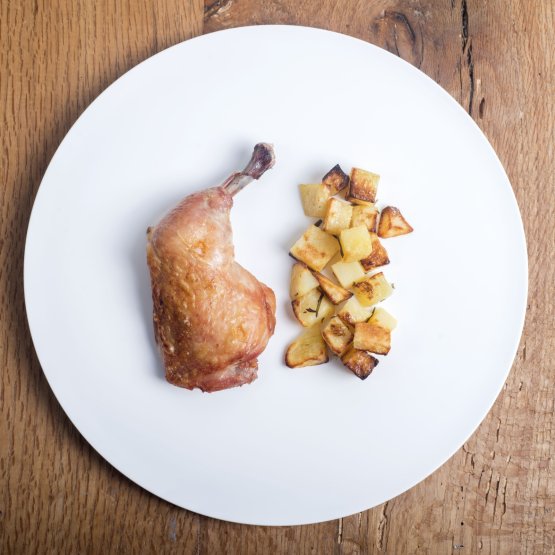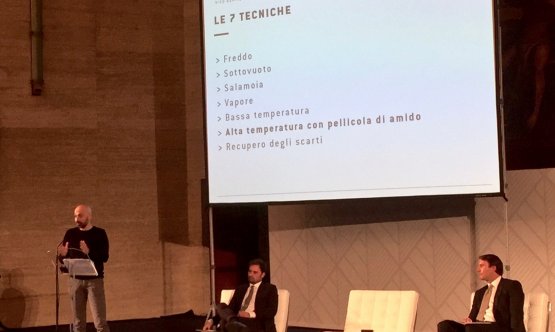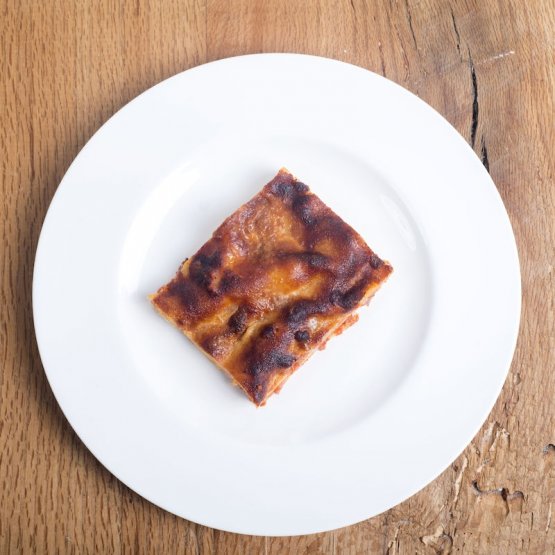Some ideas are like this: they seem banal, predictable, but only the second someone else had explained them. Take Niko Romito: for years now he’s been working on replicating and standardising recipes. He conducts his research in Castel di Sangro so as to innervate his restaurant Reale with innovation; then – to put it short for the sake of comprehension – in some cases he takes the dish, simplifies it, and creates a specific protocol. This will help the kitchen staff in the various Spazio restaurants scattered across the peninsula (who were trained at Niko Romito Formazione) to serve it better. Now, here’s the idea: why not use the same logic to create good dishes meant for hospital catering, and for canteens broadly speaking? There are two obstacles that one must overcome: 1) come to terms with the very low food cost: less than 10 euros, not per meal but per day, including all the meals, breakfast, lunch, snack and dinner; 2) interact with canteen staff who didn’t have a special training.

Roasted chicken and potatoes "alla Romito": at last there’s good food in the hospital (photo Francesco Fioramonti)
These are indeed big mountains to climb, «I must say that at first I was afraid the project wouldn’t work», but clearly
Romito managed since yesterday he was the protagonist in the dean’s lecture hall at La Sapienza di Roma, where he presented
IN-Intelligenza Nutrizionale, a protocol for experimental and interdisciplinary research in what has been defined as the “
metodo Romito” of standardisation applied to hospitals (in collaboration with
GioService, part of the
Giomi group, offering services to Italian health establishments, the
Cristo Re hospital in Rome, the Research Department for Food Science and Human Nutrition at La Sapienza and
Analysis Group).
The first and only of its kind, the IN-Intelligenza Nutrizionale project conducts scientific tests on the nutritional value of food after its transformation and thus offers to re-invent, by revolutionising it, the concept of hospital food. The picturesque yet ineffective role of the person cooking sauce to taste disappears. Romito applies industrial standardisation logic to dishes: it may sound bad but in fact it means always having high quality and reducing costs. And this with regards to hospital catering which has a yearly spending of 1 billion euros for around 1,400 public and private hospitals. Something like 200 million meals that now have a very bad reputation.

The presentation at La Sapienza in Rome
Tomorrow this may no longer be the case and it will be thanks to the “
metodo Romito” which, through
Intelligenza Nutrizionale, will be applied, for instance, to cooking tomato sauce: the process will no longer be left to the staff’s whim, but will follow a precise protocol (steam vacuum cooking for 20 minutes at 100°C and high pressure, then chilling for a few seconds to 4°C). The result: the highest organoleptic pleasure, respect for nutrients, exclusion of fat, excellence even in terms of colour of the dish, almost zero reduction of weight, which in other cases can arrive up to 30%, thus increasing the cost. In other words: flavour, nutrition, health, beauty, savings.
IN-Intelligenza Nutrizionale also starts from considering nutrition as the most important component of the physical and psychological wellbeing of hospitalised patients. «This is – Romito points out – the result of many years of experience and rigorous scientific research. It is indeed in hospitals that food should act as the first medicine. However, this is not the case. Intelligenza Nutrizionale is a revolutionary, socially useful and real project as it will be applied immediately. The organoleptic and nutritional characteristics of the new menus, the fact recipes are standardised and can be replicated are all essential, but what makes me particularly happy is that patients will be able to face the hospital experience in a different way, and the project will become an essential part of the treatment, on top of a precious tool for food education».

And there will be lasagne too... (photo by Francesco Fioramonti)
Hospital Cristo Re in Rome will be the headquarters for the pilot project, a real forerunner. It is a structure of excellence for the maternal-infantile areas and for some surgery specialties. The new kitchen will be opened this 15th December.
Technically speaking, the chef from Castel di Sangro found seven useful techniques that can be used in catering, and that make a high use of technology, «without which it is not possible to make ends meet»: cold, vacuum, brine, low temperature, high temperature (through a film of extra virgin olive oil and rice starch that is spread on the product so as to protect it from the heat, cook it outside and keep it juicy on the inside) and then the step of recuperating waste.
IN-Intelligenza Nutrizionale was born in the hospital but will not stop here: future possible uses include the entire catering industry, from schools to prisons, from company canteens to retirement homes.